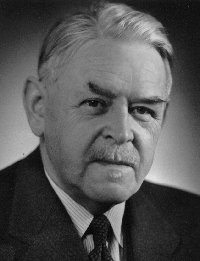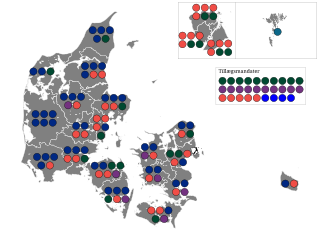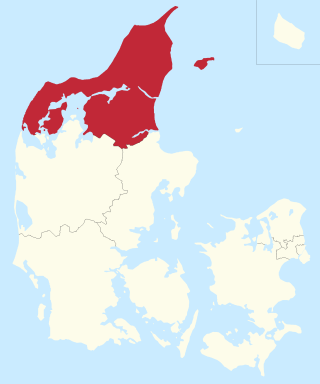| | |||||||||||||||||||||
| |||||||||||||||||||||
All 102 seats in the Folketing 52 seats needed for a majority | |||||||||||||||||||||
This lists parties that won seats. See the complete results below. | |||||||||||||||||||||
 |
|---|
Folketing elections were held in Denmark on 25 June 1884. [1]
| | |||||||||||||||||||||
| |||||||||||||||||||||
All 102 seats in the Folketing 52 seats needed for a majority | |||||||||||||||||||||
This lists parties that won seats. See the complete results below. | |||||||||||||||||||||
 |
|---|
Folketing elections were held in Denmark on 25 June 1884. [1]
 | ||||
|---|---|---|---|---|
| Party | Votes | % | Seats | |
| Venstre Reform Party | 56.3 | 81 | ||
| Højre | 38.7 | 19 | ||
| Social Democratic Party | 4.9 | 2 | ||
| Total | 102 | |||
| Registered voters/turnout | 322,429 | 59.0 | ||
| Source: Hatting, [1] Nohlen & Stöver [2] | ||||

Vilhelm Buhl was a Danish politician who served as two-time Prime Minister of Denmark from May to November 1942 during the Nazi occupation of Denmark, and again after Danish Liberation Day from May to November 1945.

Folketing elections were held in Denmark on 9 April 1895.

Folketing elections were held in Denmark on 6 May 1915. In order to make amendments to the constitution, the government called for the dissolution of both the Folketing and the Landsting to allow a new Rigsdag to make the revisions. However, as this was during World War I, no campaigning took place, and 105 of the 115 were uncontested.

Folketing elections were held in Denmark on 26 April 1920, except in the Faroe Islands, where they were held on 20 May. The election campaign was the most aggressive and bitter in Denmark in the 20th century. Voter turnout was 80.6% in Denmark proper and 58.8% in the Faroe Islands.

Landsting elections were held in Denmark on 11 May 1918, with the exceptions that the seats elected by the resigning parliament were elected on 20 March 1918, the Faroese member was elected on 13 May, and the electors that elected the candidates standing in the constituencies were elected on 30 April.

Landsting elections were held in Denmark on 10 August 1920, with the exceptions that the seats elected by the resigning parliament were elected on 26 June, the Faroese member was elected on 23 August, and the electors that elected the candidates standing in the constituencies were elected on 30 July.

Landsting elections were held in Denmark on 1 October 1920, with the exceptions that the seats elected by the resigning parliament were elected on 10 September, except for the representative of South Jutland County who was elected on October 7, the Faroese member was elected on 3 February 1921, and the electors that elected the candidates standing in the constituencies were elected on 24 September 1920.

Landsting elections were held in Denmark on 14 April 1939, with the exception that the electors that elected the candidates standing in the constituencies were elected on 3 April.

An independence referendum was held in the Faroe Islands, an autonomous territory of the Kingdom of Denmark, on 14 September 1946. Although a narrow majority of valid votes were cast in favour of the proposal (50.7%), the number of invalid votes exceeded the winning margin. Although independence was declared by the Speaker of the Løgting on 18 September 1946, the declaration was not recognised by Denmark. King Christian X of Denmark dissolved the Løgting and called fresh elections, which were won by unionist parties. The islands were subsequently given a greater level of self-rule.

Folketing elections were held in Denmark on 20 April 1892.

Folketing elections were held in Denmark on 21 January 1890.

Folketing elections were held in Denmark on 28 January 1887.

Landsting elections were held in Denmark on 23 September 1924, with the exception that the electors were elected on 18 September.

Landsting elections were held in Denmark on 21 September 1928, with the exceptions that the electors were elected on 14 September, that the candidates elected by the resigning parliament were elected on 15 August, and that the Faroese candidate was elected by the Løgting on 23 August.

Landsting elections were held in Denmark on 13 September 1932, with the exception that the electors were elected on 5 September.

Landsting elections were held in Denmark on 22 September 1936, with the exceptions that the electors were elected on 15 September and that the candidates elected by the resigning parliament were elected on 14 August.
The Society of the Friends of Peasants was a liberal Danish political society founded on 5 May 1846 by members of the provincial consultative assemblies Johan Christian Drewsen and Balthazar Christensen, with the intent to promote the liberation of the peasantry and equality among the different classes of society. Among its most politically influential members were Anton Frederik Tscherning, Jens Andersen Hansen and Carl Christian Alberti.

Landsting elections were held in Denmark on 6 April 1943, with the exception that the electors were elected on 23 March. Along with the corresponding Folketing election, it was the first election during the German occupation, and although many people feared how the Germans might react to the election, the event took place peacefully.

Landsting elections were held in Denmark in March and April 1947. The public elected members of the electoral college on 1 April, who in turn elected 29 members of the Landsting on 11 April. A further 19 members were elected by outgoing parliament on 7 March, while a Faroese member was elected by the Løgting on 26 March.

North Jutland is one of the 12 multi-member constituencies of the Folketing, the national legislature of Denmark. The constituency was established in 2007 following the public administration structural reform. It consists of the municipalities of Aalborg, Brønderslev, Frederikshavn, Hjørring, Jammerbugt, Læsø, Mariagerfjord, Morsø, Rebild, Thisted and Vesthimmerland. The constituency currently elects 15 of the 179 members of the Folketing using the open party-list proportional representation electoral system. At the 2022 general election it had 447,556 registered electors.